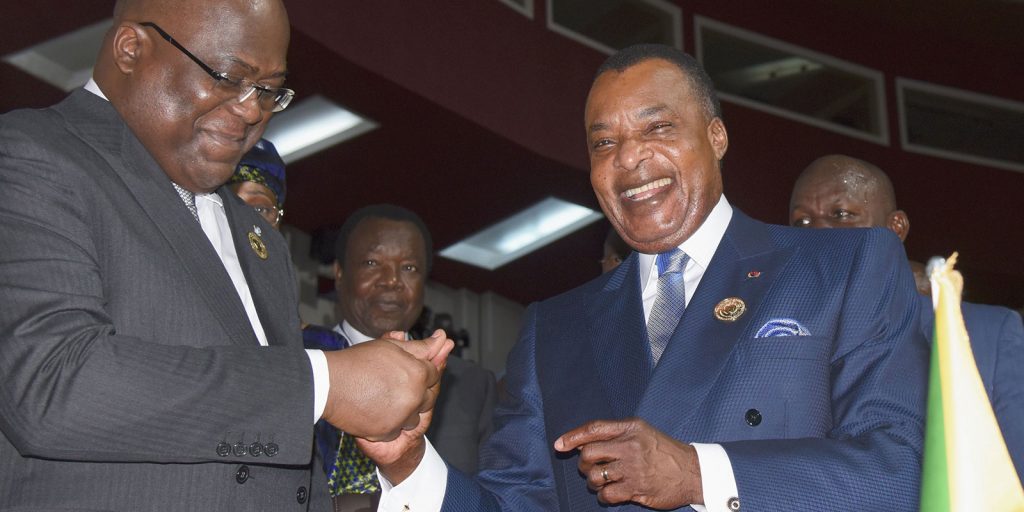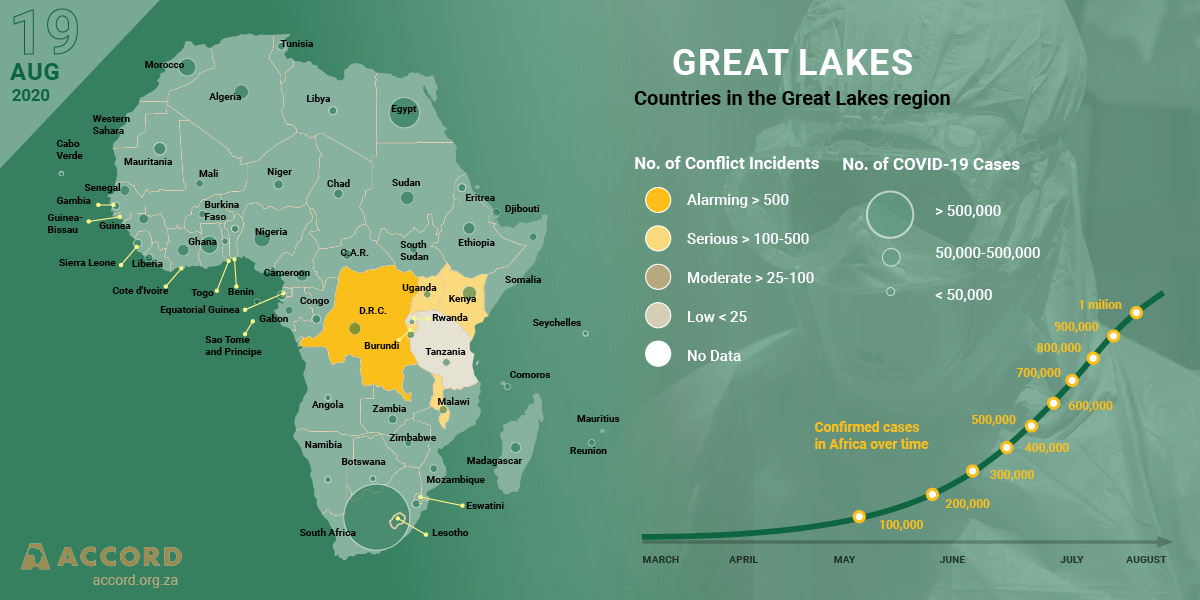At its onset, the pandemic caused an initial standstill, during which countries of the region, just as others across the globe, concentrated their efforts on curbing its spread. Many countries in the region took swift action, implementing lockdowns, quarantines, border closures and other key public health measures shortly after the region’s first COVID-19 case was reported at the beginning of March. Regionally, the East African Community (EAC), the International Conference on the Great Lakes Region (ICGLR) and the Southern African Development Community (SADC) were quick to promote collective health measures and harmonised guidelines, among others, in an effort to contain the pandemic and mitigate its impacts.
COVID-19 and its repercussions on the region
As an immediate result, the first weeks of the pandemic affected regional political processes, including efforts to implement the Peace, Security and Cooperation (PSC) Framework for the DRC and the region – a cornerstone agreement signed in 2013 to address the root causes of conflict and foster peaceful relations in the region. For instance, the convening of the 10th Summit of the Regional Oversight Mechanism (ROM) – the principal dialogue and decision-making mechanism of the PSC Framework – which was initially scheduled for February, was postponed. The Great Lakes Investment and Trade Conference (GLITC) – a critical effort to enhance regional economic cooperation through trade and investment – scheduled to be held in Kigali, Rwanda in March, also had to be postponed.

While it seemed at first that progress on key regional cooperation initiatives was left pending, the Great Lakes countries gradually adapted to the new realities of conducting business amid the pandemic. The resumption, in June, of the quadripartite process on the normalisation of Rwanda–Uganda relations, facilitated by the DRC and Angola, and the pursuit by the DRC and Zambia of diplomatic solutions to their border dispute, with the support of SADC, both attest to this positive trend.
Political risks associated with COVID-19 responses have also been kept in check so far, including with respect to elections. The Central African Republic, Sudan, Tanzania and Uganda – all slated to hold elections within the next six months – have opted to proceed with electoral preparations. The political transition in Burundi, following the general elections held in May, could pave the way for new, positive dynamics within its borders and beyond.
It is difficult to establish a correlation between COVID-19 and armed group activity in the Great Lakes region, including the eastern DRC, but attacks against the civilian population continue @HuangXia16 #C19ConflictMonitor
Tweet
In terms of security, it is difficult to establish a direct correlation between the COVID-19 pandemic and armed group activity in the region, and more particularly in eastern DRC. However, attacks against the civilian population have continued, and even increased slightly in some provinces, underscoring the continued urgency of the United Nations (UN) Secretary-General’s call for a global ceasefire.
Economically, the COVID-19 pandemic was a hard blow to the Great Lakes region, where most countries were already achieving or expected to achieve economic growth. In 7 of the 13 signatory countries of the PSC Framework, economic activity is expected to contract this year, while the remainder will likely register more modest growths than previously forecast. Already, the outbreak has come at great socio-economic cost, especially for the most vulnerable people dependent on informal revenue sources and with limited or no access to secure jobs and social safety nets. Rising food prices, unemployment and falling exports are further increasing pressures on already fragile economies.
The pandemic has also put a spotlight on human rights issues, including in the context of the emergency measures taken and of greater vulnerability to gender-based violence, and on inequalities, including with relation to labour rights, access to healthcare, gender issues and social protection. It has affected the mobility of refugees, migrants and internally displaced persons, and constrained humanitarian access in some areas.
As an overarching consequence, the COVID-19 pandemic has placed progress towards achieving the Sustainable Development Goals in the Great Lakes region at great peril.
The COVID-19 pandemic has placed progress towards the @SDG2030 in the Great Lakes region at great peril @HuangXia16 #C19ConflictMonitor
Tweet
The imperative of cooperation and solidarity
Regional cooperation is paramount to effectively fight the pandemic and mitigate its impacts, especially as countries are starting to ease COVID-19 restrictions, despite rising infection rates. Enhanced joint efforts to boost the region’s resilience to the current and future health crises and to limit the pandemic’s socio-economic impacts should be the priorities. On the former, the Great Lakes region can draw on valuable lessons from previous epidemics, such as Ebola, to engage communities and address transboundary risks. The region should also be supported in its efforts to preserve and ensure safe transport connectivity and trade across borders, where related incidents have caused tensions between some countries in recent months.
International solidarity and steadfast support are imperative. In line with the UN Secretary-General’s call for solidarity, hope and political will to see this crisis through together, a comprehensive, coordinated effort by all countries and international partners is essential to help the region address this situation and ensure that recent gains in regional cooperation are sustained and advanced. In this context, I have engaged regional and multilateral financial institutions and private sector representatives to mobilise much-needed resources. The GLITC, now scheduled for 2–3 December in Kigali, Rwanda, will further contribute to identifying cross-border trade and investment opportunities in the region. Virtual consultations with women entrepreneurs, business leaders, experts and regional stakeholders on empowering women and promoting their participation in peacebuilding, which I convened, will feed into an upcoming meeting by the Peacebuilding Commission on Women, Peace and Security in September, among others. A virtual meeting with the national human rights institutions from the region, which my office co-organised with the ICGLR, highlighted the critical importance of continuing to enhance national capacities to promote and protect human rights, even in times of crisis.
Finally, while the pandemic has led to a realignment of priorities towards health and socio-economic responses at national and regional levels, it will be critical to further advance peace and security initiatives, especially with regard to the eradication of foreign armed groups in eastern DRC – a source of persistent mistrust between countries in the region. To this end, I am continuing to support efforts to facilitate dialogue and build confidence among countries in the region, and to promote a comprehensive security approach towards foreign armed groups.
Looking ahead, I am convinced that even though COVID-19 presents the Great Lakes region with unprecedented challenges, it can also contribute to enhanced regional cooperation. In working closely with Uganda and the DRC and the outgoing and incoming ROM chairs, my office lends its full support to the region in protecting the gains made so far in the fight against the pandemic, and in paving the way for a quick recovery that is built around a more inclusive, stable and sustainable future.
Huang Xia is Special Envoy of the UN Secretary-General for the Great Lakes region.
Endnote
- The Great Lakes region comprises the 13 signatory countries of the Peace, Security and Cooperation Framework for the Democratic Republic of the Congo and the region: Angola, Burundi, the Central African Republic, the Republic of Congo, the Democratic Republic of the Congo, Kenya, Rwanda, South Africa, South Sudan, Sudan, Tanzania, Uganda and Zambia.

